Ziheng Qin
MIRROR: Manifold Ideal Reference ReconstructOR for Generalizable AI-Generated Image Detection
Feb 02, 2026Abstract:High-fidelity generative models have narrowed the perceptual gap between synthetic and real images, posing serious threats to media security. Most existing AI-generated image (AIGI) detectors rely on artifact-based classification and struggle to generalize to evolving generative traces. In contrast, human judgment relies on stable real-world regularities, with deviations from the human cognitive manifold serving as a more generalizable signal of forgery. Motivated by this insight, we reformulate AIGI detection as a Reference-Comparison problem that verifies consistency with the real-image manifold rather than fitting specific forgery cues. We propose MIRROR (Manifold Ideal Reference ReconstructOR), a framework that explicitly encodes reality priors using a learnable discrete memory bank. MIRROR projects an input into a manifold-consistent ideal reference via sparse linear combination, and uses the resulting residuals as robust detection signals. To evaluate whether detectors reach the "superhuman crossover" required to replace human experts, we introduce the Human-AIGI benchmark, featuring a psychophysically curated human-imperceptible subset. Across 14 benchmarks, MIRROR consistently outperforms prior methods, achieving gains of 2.1% on six standard benchmarks and 8.1% on seven in-the-wild benchmarks. On Human-AIGI, MIRROR reaches 89.6% accuracy across 27 generators, surpassing both lay users and visual experts, and further approaching the human perceptual limit as pretrained backbones scale. The code is publicly available at: https://github.com/349793927/MIRROR
Scaling Up AI-Generated Image Detection via Generator-Aware Prototypes
Dec 15, 2025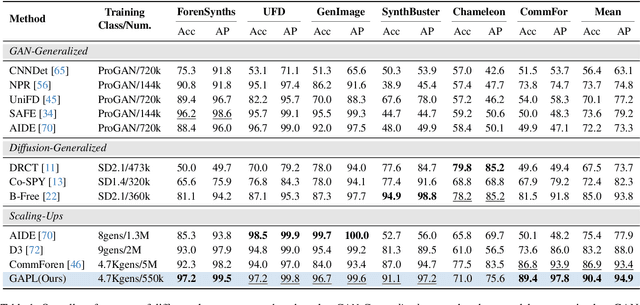
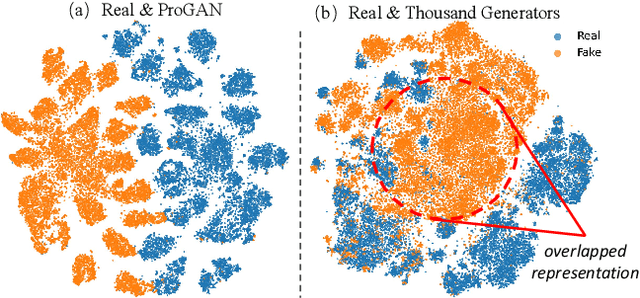
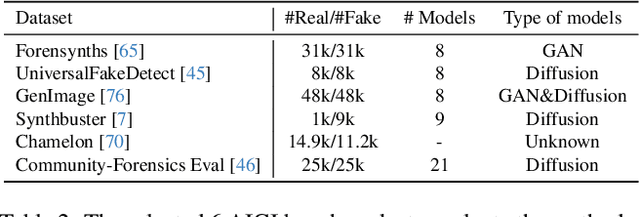
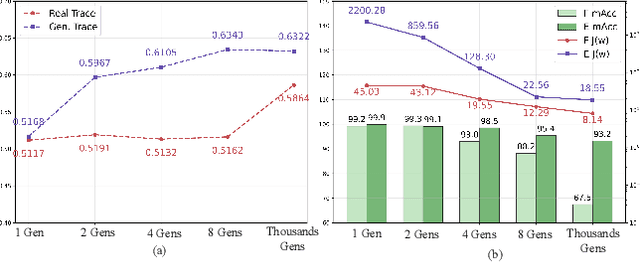
Abstract:The pursuit of a universal AI-generated image (AIGI) detector often relies on aggregating data from numerous generators to improve generalization. However, this paper identifies a paradoxical phenomenon we term the Benefit then Conflict dilemma, where detector performance stagnates and eventually degrades as source diversity expands. Our systematic analysis, diagnoses this failure by identifying two core issues: severe data-level heterogeneity, which causes the feature distributions of real and synthetic images to increasingly overlap, and a critical model-level bottleneck from fixed, pretrained encoders that cannot adapt to the rising complexity. To address these challenges, we propose Generator-Aware Prototype Learning (GAPL), a framework that constrain representation with a structured learning paradigm. GAPL learns a compact set of canonical forgery prototypes to create a unified, low-variance feature space, effectively countering data heterogeneity.To resolve the model bottleneck, it employs a two-stage training scheme with Low-Rank Adaptation, enhancing its discriminative power while preserving valuable pretrained knowledge. This approach establishes a more robust and generalizable decision boundary. Through extensive experiments, we demonstrate that GAPL achieves state-of-the-art performance, showing superior detection accuracy across a wide variety of GAN and diffusion-based generators. Code is available at https://github.com/UltraCapture/GAPL
Info-Coevolution: An Efficient Framework for Data Model Coevolution
Jun 09, 2025



Abstract:Machine learning relies heavily on data, yet the continuous growth of real-world data poses challenges for efficient dataset construction and training. A fundamental yet unsolved question is: given our current model and data, does a new data (sample/batch) need annotation/learning? Conventional approaches retain all available data, leading to non-optimal data and training efficiency. Active learning aims to reduce data redundancy by selecting a subset of samples to annotate, while it increases pipeline complexity and introduces bias. In this work, we propose Info-Coevolution, a novel framework that efficiently enables models and data to coevolve through online selective annotation with no bias. Leveraging task-specific models (and open-source models), it selectively annotates and integrates online and web data to improve datasets efficiently. For real-world datasets like ImageNet-1K, Info-Coevolution reduces annotation and training costs by 32\% without performance loss. It is able to automatically give the saving ratio without tuning the ratio. It can further reduce the annotation ratio to 50\% with semi-supervised learning. We also explore retrieval-based dataset enhancement using unlabeled open-source data. Code is available at https://github.com/NUS-HPC-AI-Lab/Info-Coevolution/.
* V1
DD-Ranking: Rethinking the Evaluation of Dataset Distillation
May 19, 2025
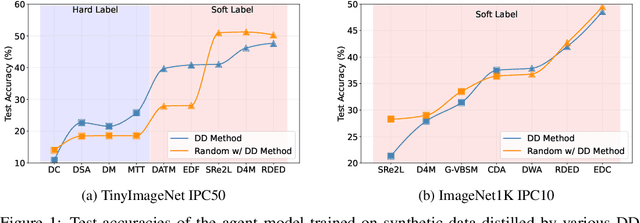
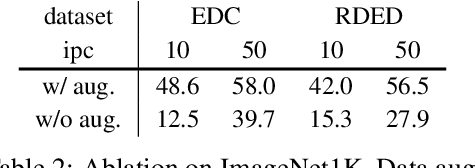
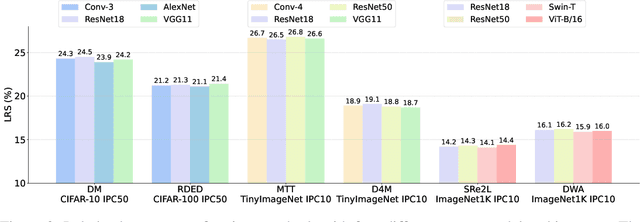
Abstract:In recent years, dataset distillation has provided a reliable solution for data compression, where models trained on the resulting smaller synthetic datasets achieve performance comparable to those trained on the original datasets. To further improve the performance of synthetic datasets, various training pipelines and optimization objectives have been proposed, greatly advancing the field of dataset distillation. Recent decoupled dataset distillation methods introduce soft labels and stronger data augmentation during the post-evaluation phase and scale dataset distillation up to larger datasets (e.g., ImageNet-1K). However, this raises a question: Is accuracy still a reliable metric to fairly evaluate dataset distillation methods? Our empirical findings suggest that the performance improvements of these methods often stem from additional techniques rather than the inherent quality of the images themselves, with even randomly sampled images achieving superior results. Such misaligned evaluation settings severely hinder the development of DD. Therefore, we propose DD-Ranking, a unified evaluation framework, along with new general evaluation metrics to uncover the true performance improvements achieved by different methods. By refocusing on the actual information enhancement of distilled datasets, DD-Ranking provides a more comprehensive and fair evaluation standard for future research advancements.
Boosting LLM via Learning from Data Iteratively and Selectively
Dec 23, 2024



Abstract:Datasets nowadays are generally constructed from multiple sources and using different synthetic techniques, making data de-noising and de-duplication crucial before being used for post-training. In this work, we propose to perform instruction tuning by iterative data selection (\ApproachName{}). We measure the quality of a sample from complexity and diversity simultaneously. Instead of calculating the complexity score once for all before fine-tuning, we highlight the importance of updating this model-specific score during fine-tuning to accurately accommodate the dynamic changes of the model. On the other hand, the diversity score is defined on top of the samples' responses under the consideration of their informativeness. IterIT integrates the strengths of both worlds by iteratively updating the complexity score for the top-ranked samples and greedily selecting the ones with the highest complexity-diversity score. Experiments on multiple instruction-tuning data demonstrate consistent improvements of IterIT over strong baselines. Moreover, our approach also generalizes well to domain-specific scenarios and different backbone models. All resources will be available at https://github.com/JiaQiSJTU/IterIT.
Visual Perception in Text Strings
Oct 02, 2024



Abstract:Understanding visual semantics embedded in consecutive characters is a crucial capability for both large language models (LLMs) and multi-modal large language models (MLLMs). This type of artifact possesses the unique characteristic that identical information can be readily formulated in both texts and images, making them a significant proxy for analyzing modern LLMs' and MLLMs' capabilities in modality-agnostic vision understanding. In this work, we select ASCII art as a representative artifact, where the lines and brightness used to depict each concept are rendered by characters, and we frame the problem as an ASCII art recognition task. We benchmark model performance on this task by constructing an evaluation dataset with an elaborate categorization tree and also collect a training set to elicit the models' visual perception ability. Through a comprehensive analysis of dozens of models, results reveal that although humans can achieve nearly 100% accuracy, the state-of-the-art LLMs and MLLMs lag far behind. Models are capable of recognizing concepts depicted in the ASCII arts given only text inputs indicated by over 60% accuracy for some concepts, but most of them achieves merely around 30% accuracy when averaged across all categories. When provided with images as inputs, GPT-4o gets 82.68%, outperforming the strongest open-source MLLM by 21.95%. Although models favor different kinds of ASCII art depending on the modality provided, none of the MLLMs successfully benefit when both modalities are supplied simultaneously. Moreover, supervised fine-tuning helps improve models' accuracy especially when provided with the image modality, but also highlights the need for better training techniques to enhance the information fusion among modalities.
Dataset Growth
May 28, 2024



Abstract:Deep learning benefits from the growing abundance of available data. Meanwhile, efficiently dealing with the growing data scale has become a challenge. Data publicly available are from different sources with various qualities, and it is impractical to do manual cleaning against noise and redundancy given today's data scale. There are existing techniques for cleaning/selecting the collected data. However, these methods are mainly proposed for offline settings that target one of the cleanness and redundancy problems. In practice, data are growing exponentially with both problems. This leads to repeated data curation with sub-optimal efficiency. To tackle this challenge, we propose InfoGrowth, an efficient online algorithm for data cleaning and selection, resulting in a growing dataset that keeps up to date with awareness of cleanliness and diversity. InfoGrowth can improve data quality/efficiency on both single-modal and multi-modal tasks, with an efficient and scalable design. Its framework makes it practical for real-world data engines.
Preventing Zero-Shot Transfer Degradation in Continual Learning of Vision-Language Models
Mar 12, 2023



Abstract:Continual learning (CL) can help pre-trained vision-language models efficiently adapt to new or under-trained data distributions without re-training. Nevertheless, during the continual training of the Contrastive Language-Image Pre-training (CLIP) model, we observe that the model's zero-shot transfer ability significantly degrades due to catastrophic forgetting. Existing CL methods can mitigate forgetting by replaying previous data. However, since the CLIP dataset is private, replay methods cannot access the pre-training dataset. In addition, replaying data of previously learned downstream tasks can enhance their performance but comes at the cost of sacrificing zero-shot performance. To address this challenge, we propose a novel method ZSCL to prevent zero-shot transfer degradation in the continual learning of vision-language models in both feature and parameter space. In the feature space, a reference dataset is introduced for distillation between the current and initial models. The reference dataset should have semantic diversity but no need to be labeled, seen in pre-training, or matched image-text pairs. In parameter space, we prevent a large parameter shift by averaging weights during the training. We propose a more challenging Multi-domain Task Incremental Learning (MTIL) benchmark to evaluate different methods, where tasks are from various domains instead of class-separated in a single dataset. Our method outperforms other methods in the traditional class-incremental learning setting and the MTIL by 9.7% average score. Our code locates at https://github.com/Thunderbeee/ZSCL.
InfoBatch: Lossless Training Speed Up by Unbiased Dynamic Data Pruning
Mar 08, 2023



Abstract:Data pruning aims to obtain lossless performances as training on the original data with less overall cost. A common approach is to simply filter out samples that make less contribution to the training. This leads to gradient expectation bias between the pruned and original data. To solve this problem, we propose \textbf{InfoBatch}, a novel framework aiming to achieve lossless training acceleration by unbiased dynamic data pruning. Specifically, InfoBatch randomly prunes a portion of less informative samples based on the loss distribution and rescales the gradients of the remaining samples. We train the full data in the last few epochs to improve the performance of our method, which further reduces the bias of the total update. As a plug-and-play and architecture-agnostic framework, InfoBatch consistently obtains lossless training results on CIFAR-10, CIFAR-100, Tiny-ImageNet, and ImageNet-1K saving 40\%, 33\%, 30\%, and 26\% overall cost, respectively. We extend InfoBatch into semantic segmentation task and also achieve lossless mIoU on ADE20K dataset with 20\% overall cost saving. Last but not least, as InfoBatch accelerates in data dimension, it further speeds up large-batch training methods (\textit{eg.} LARS and LAMB) by 1.3 times without extra cost or performance drop. The code will be made public.
 Add to Chrome
Add to Chrome Add to Firefox
Add to Firefox Add to Edge
Add to Edge